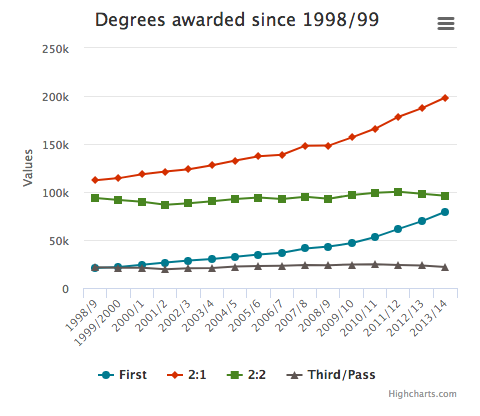GCSE results day was today; A level results have already past. The fuss surrounding them shows just how the first quarter of our life is so dominated by the pursuit of knowledge. We are driven not by interest or creativity but labour through three levels of formal verification to prove we can remember things that have been fed to us in the right order, and then regurgitate that information onto a page on demand. While this regurgitation is admirable does it really count for much? The answer is no.
This isn’t just my opinion: we can see clear evidence of employers from all sectors no longer placing any value in a uni degree, even if thats a first from oxbridge. This is primarily because of two things; the first being that unis no longer have a limit to the number of students they can accept and the more students they take, the more money they make. Secondly nearly everyone gets a 2.i with a 2.ii being the new third and a first being mildly commendable.
While most would say this marks our whole education system as redundant there are some interesting side effects. With so many young degree holders employers have been forced to use other tools to find the most suitable staff. This includes psychometric testing for personality, aptitude and general intelligence—things a 2.i from a Russell Group university often fails to guarantee. Testing IQ can strip away social advantages like private education and drills down to underlying potential.
Out of the companies that used psychometric testing 81% said that they expected to make more reliable and less risky decisions as a result in 2016, compared to only 67% who said the same thing in 2010.
In fact if we could slim down the school system and instead seek out people for certain industries or jobs according to these clever tests we could give equal opportunity to all, as well as streamlining our education system. People could specialise much earlier and not have to waste 5 years of their life learning 7 subjects that they have no interest and will most likely never use practically.
Yes there is reason to set a base foundation in general subjects. But are advanced algebra or in depth geology ever going to be practically used by the vast majority of the population?
We can either reform the education system, restricting student places, in order to once again make a degree a clear and rare signal of ability and application. Or we could accept that the system is broken and as a collective decide to move away from formalised testing of a syllabus and rote learning. Instead, we could make greater use of aptitude testing from a younger age and try and streamline the population into pursuits that they not only have talent in but also hold a genuine interest.
https://www.adamsmith.org/blog/do-you-need-a-uni-degree [

